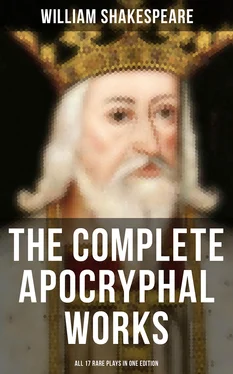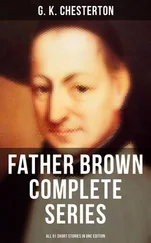WIFE.
Oh, heaven knows
That my complaints were praises, and best words
Of you and your estate: only my friends
Knew of our mortgaged Lands, and were possest
Of every accident before I came.
If thou suspect it but a plot in me
To keep my dowrie, or for mine own good
Or my poor childrens: (though it suits a mother
To show a natural care in their reliefs)
Yet I’ll forget my self to calm your blood:
Consume it, as your pleasure counsels you,
And all I wish e’en Clemency affords:
Give me but comely looks and modest words.
HUSBAND.
Money, hore, money, or I’ll—
[Draws his dagger.]
[Enters a servant very hastily.]
What the devil? how now? thy hasty news?
[To his man.]
SERVINGMAN.
May it please you, sir—
[Servant in a fear.]
HUSBAND. What? May I not look upon my dagger? Speak villain, or I will execute the point on thee: quick, short.
SERVINGMAN. Why, sir, a gentleman from the University stays below to speak with you.
HUSBAND.
From the University? so! University—
That long word runs through me.
[Exit.]
WIFE.
Was ever wife so wretchedly beset?
[Wife alone.]
Had not this news stept in between, the point
Had offered violence unto my breast.
That which some women call great misery
Would show but little here: would scarce be seen
Amongst my miseries. I may Compare
For wretched fortunes with all wives that are.
Nothing will please him, until all be nothing.
He calls it slavery to be preferd,
A place of credit a base servitude.
What shall become of me, and my poor children,
Two here, and one at nurse, my pretty beggers?
I see how ruin with a palsy hand
Begins to shake the auncient seat to dust:
The heavy weight of sorrow draws my lids
Over my dankish eyes: I can scarce see:
Thus grief will last; it wakes and sleeps with me.
[Exit.]
SCENE IV. Another apartment in the same.
[Enter the Husband with the master of the College.]
HUSBAND.
Please you draw near, sir, y’are exceeding welcome.
MASTER.
Thats my doubt; I fear, I come not to be welcome.
HUSBAND.
Yes, howsoever.
MASTER. Tis not my fashion, Sir, to dwell in long circumstance, but to be plain, and effectual; therefore, to the purpose. The cause of my setting forth was piteous and lamentable: that hopeful young gentleman, your brother, whose vertues we all love dearly, through your default and unnatural negligence, lies in bond executed for your debt, a prisoner, all his studies amazed, his hope struck dead, and the pride of his youth muffled in these dark clouds of oppression.
HUSBAND.
Hum, um, um.
MASTER. Oh, you have kild the towardest hope of all our university: Wherefore, without repentance and ameds, expect pondrous and sudden Judgements to fall grievously upon you. Your brother, a man who profited in his divine Imployments, might have made ten thousand souls fit for heaven, now by your careless courses cast in prison, which you must answer for, and assure your spirit it will come home at length.
HUSBAND.
Oh god! oh!
MASTER. Wise men think ill of you, others speak ill of you, no man loves you, nay, even those whom honesty condemns, condemn you: and take this from the vertuous affection I bear your brother; never look for prosperous hour, good thought, quiet sleeps, contented walks, nor any thing that makes man perfect til you redeem him. What is your answer? how will you bestow him? upon desperate misery, or better hopes? I suffer, till I have your answer.
HUSBAND. Sir, you have much wrought with me. I feel you in my soul, you are your arts master. I never had sense til now; your syllables have cleft me. Both for your words and pains I thank you: I cannot but acknowledge grievous wrongs done to my brother, mighty, mighty, mighty wrongs.—Within there!
[Enter a servingman.]
HUSBAND.
Sir, Fill me a bowl of wine. Alas, poor brother,
Brus’d with an execution for my sake.
[Exit servant for wine.]
MASTER.
A bruse indeed makes many a moral sore
Till the grave cure em.
[Enter with wine.]
HUSBAND.
Sir, I begin to you, y’ave chide your welcome.
MASTER.
I could have wisht it better for your sake.
I pledge you, sir, to the kind man in prison.
HUSBAND.
Let it be so. Now, Sir, if you so please.
[Drink both.]
To spend but a few minutes in a walk
About my grounds below, my man here shall
Attend you.
I doubt not but by that time to be furnisht
Of a sufficient answer, and therein
My brother fully satisfied.
MASTER.
Good sir, in that the Angells would be pleased,
And the worlds murmurs calmd, and I should say
I set forth then upon a lucky day.
[Exit.]
HUSBAND. Oh thou confused man! thy pleasant sins have undone thee, thy damnation has beggerd thee! That heaven should say we must not sin, and yet made women! gives our senses way to find pleasure, which being found confounds us. Why should we know those things so much misuse us?—oh, would vertue had been forbidden! we should then have proved all vertuous, for tis our blood to love that were forbidden. Had not drunkenness been forbidden, what man would have been fool to a beast, and Zany to a swine, to show tricks in the mire? what is there in three dice to make a man draw thrice three thousand acres into the compass of a round little table, and with the gentlemans palsy in the hand shake out his posterity thieves or beggars? Tis done! I ha dont, yfaith: terrible, horrible misery.— How well was I left! very well, very well. My Lands shewed like a full moon about me, but now the moon’s ith last quarter, waning, waning: And I am mad to think that moon was mine; Mine and my fathers, and my forefathers—generations, generations: down goes the house of us, down, down it sinks. Now is the name a beggar, begs in me! that name, which hundreds of years has made this shiere famous, in me, and my posterity, runs out. In my seed five are made miserable besides my self: my riot is now my brothers jailer, my wives sighing, my three boys penury, and mine own confusion.
[Tears his hair.]
Why sit my hairs upon my cursed head?
Will not this poison scatter them? oh my brother’s
In execution among devils that
Stretch him and make him give. And I in want,
Not able for to live, nor to redeem him.
Divines and dying men may talk of hell,
But in my heart her several torments dwell.
Slavery and misery! Who in this case
Would not take up money upon his soul,
Pawn his salvation, live at interest?
I, that did ever in abundance dwell,
For me to want, exceeds the throws of hell.
[Enter his little son with a top and a scourge.]
SON. What, ail you father? are you not well? I cannot scourge my top as long as you stand so: you take up all the room with your wide legs. Puh, you cannot make me afeard with this; I fear no vizards, nor bugbears.
[Husband takes up the child by the skirts of his long coat in one hand and draws his dagger with th’ other.]
HUSBAND.
Up, sir, for here thou hast no inheritance left.
SON.
Oh, what will you do, father? I am your white boy.
HUSBAND.
Thou shalt be my red boy: take that.
[Strikes him.]
SON.
Oh, you hurt me, father.
HUSBAND. My eldest beggar! thou shalt not live to ask an usurer bread, to cry at a great mans gate, or follow, good your honour, by a Couch; no, nor your brother; tis charity to brain you.
SON.
How shall I learn now my heads broke?
HUSBAND.
Bleed, bleed rather than beg, beg!
[Stabs him.]
Be not thy names disgrace:
Читать дальше












![Уильям Шекспир - The Works of William Shakespeare [Cambridge Edition] [Vol. 1 of 9]](/books/746589/uilyam-shekspir-the-works-of-william-shakespeare-c-thumb.webp)